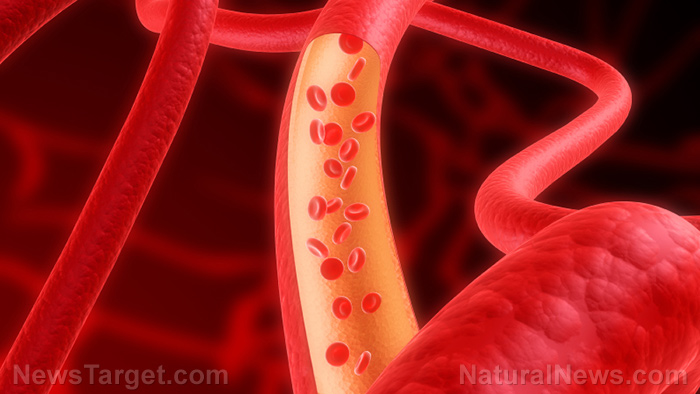Being overweight damages blood vessels, warn researchers: Maintain a healthy weight to prevent “internal stress”
09/08/2020 / By Virgilio Marin

Obese individuals have higher levels of a protein linked to blood vessel damage, found a study published in the journal Science Translational Medicine.
This protein is called the wingless-related integration site 5A, or WNT5A. It triggers internal or oxidative stress and promotes the build-up of substances in the blood vessels. Over time, this build-up could develop into plaques and lead to atherosclerosis, a condition that often leads to a heart attack.
Researchers from the U.K. and Greece said that targeting this protein could be an effective way of preventing heart disease among obese individuals.
“If we develop a treatment to ‘switch off’ the production of WNT5A from fat cells, or block its effects on the [blood vessel] wall, then we may be able to ‘neutralize’ obesity and prevent heart attacks and stroke,” said co-author Charalambos Antoniades of the University of Oxford.
Protein promotes release of harmful products
Obesity is one of the major health problems in the United States. Data from the National Health and Nutrition Examination Survey shows that around 42.4 percent of American adults were obese between 2017 and 2018. From 1999 to 2000, the prevalence was 30.5 percent, suggesting that the cases of obesity are rising.
Obesity increases a person’s risk of several diseases including heart disease, which is currently the number one cause of death in the United States. There are several risk factors for heart disease, and it has been shown that impaired blood vessels play a major role in its development.
In the study, researchers examined how obesity affects blood vessels. They examined blood and tissue samples from more than 1,000 thousand individuals with atherosclerosis, some of whom are obese.
They found that obese patients had much higher levels of WNT5A in their blood, as well as elevated expression of Frizzled 2 and Frizzled 5 – WNT5A receptors – in the walls of their arteries. This protein, the researchers discovered, promoted the activation of certain toxic products which led to oxidative stress.
Furthermore, individuals with higher WNT5A levels tended to have a faster progression of plaque buildup in the arteries in the next three to five years.
“This protein is not only significantly elevated in obese patients but also exerts injury to blood vessels,” said Dr. Benjamin Hirsh of the Sandra Atlas Bass Heart Hospital. Dr. Hirsch is not part of the study. (Related: Being fat doubles your risk of dying from coronavirus, study claims.)
He said that the WNT5A pathway is only one of the many ways that obesity damages blood vessels, and called the study an important first step in the research on obesity.
Cardiologist Dr. Salim Virani of the Michael E. DeBakey VA Medical Center in Houston said that similar research could help medical professionals come up with better solutions to prevent heart disease. But Dr. Virani, who is not part of the study, noted that having a healthy lifestyle is still the best way to prevent diseases: “Diet and exercise will always come first.”
Tips for fighting obesity
Maintaining a healthy weight through a healthy lifestyle is key to lowering obesity risk.
The Centers for Disease Control and Prevention (CDC) recommends following a healthy and realistic diet as well as eating breakfast every day. The latter, said the CDC, is a common practice among people who have maintained their weight, as it helps keep people from getting too hungry and overeating later in the day.
For a healthy diet, the CDC advises eating more fruits, vegetables, whole grains and fat-free or low-fat dairy products. Lean meats, beans and nuts should also be integrated into the diet while foods high in saturated and trans fat, as well as sodium and added sugar, are best avoided. (Related: Sugar industry promotes obesity, diabetes and heart disease.)
It’s also important to exercise daily. This means getting 60 to 90 minutes of exercise that could take various forms such as brisk walking. An hour’s worth of exercise also does not have to be completed all at once; exercising for 20 minutes at a time also works.
With the diseases linked to obesity, a healthy lifestyle should be everyone’s priority. Start living a healthy lifestyle by following the tips above.
Learn more about how to prevent obesity at FightObesity.news.
Sources include:
CDC.gov 1 [PDF]
Tagged Under: anit-obesity, atherosclerosis, blood vessels, cardiovascular disease, cardiovascular health, cardiovascular risk factors, fightobesity, heart disease, obesity, overweight, oxidative stress, plaque buildup, vascular health, weight gain
RECENT NEWS & ARTICLES
COPYRIGHT © 2017 HEART NEWS




















